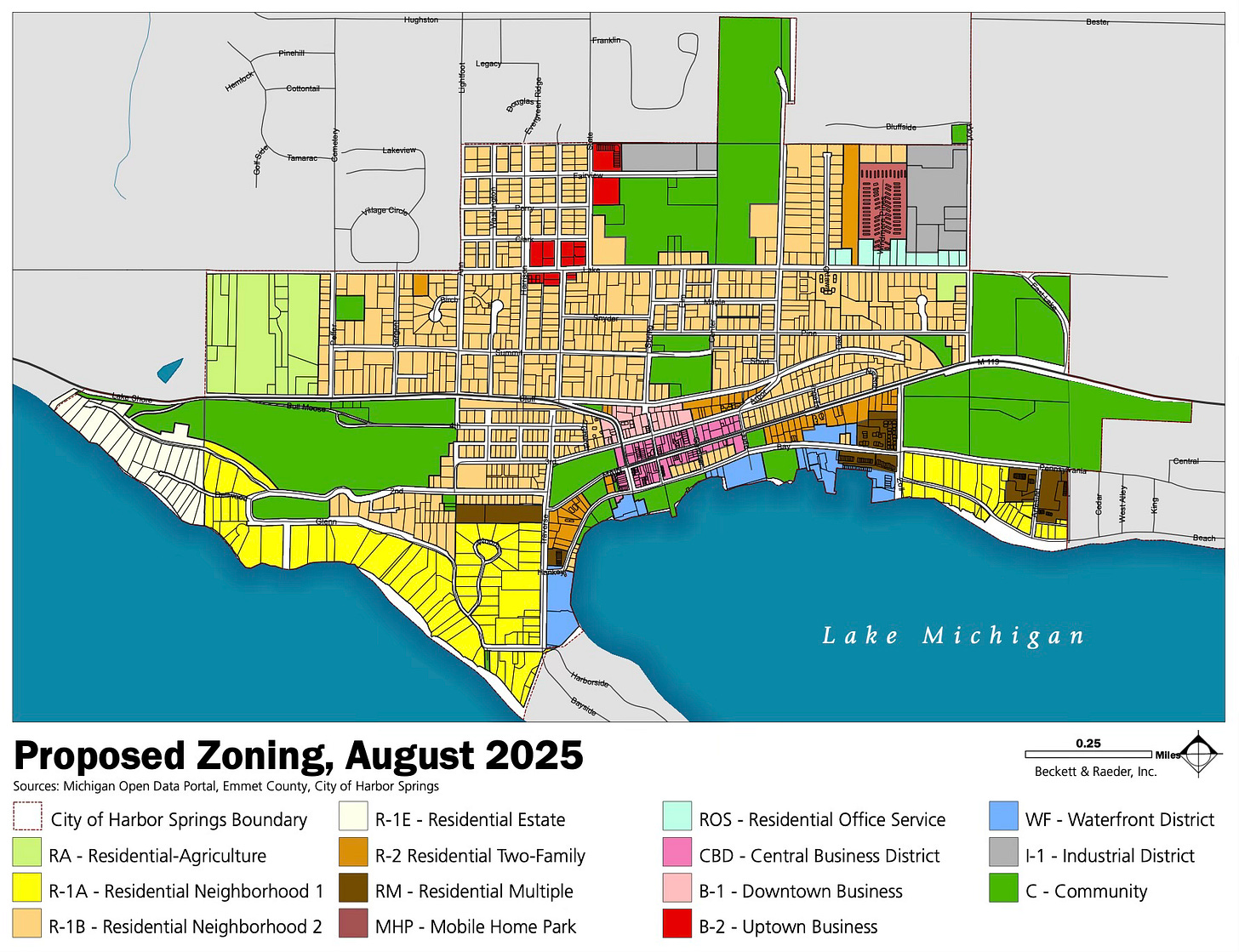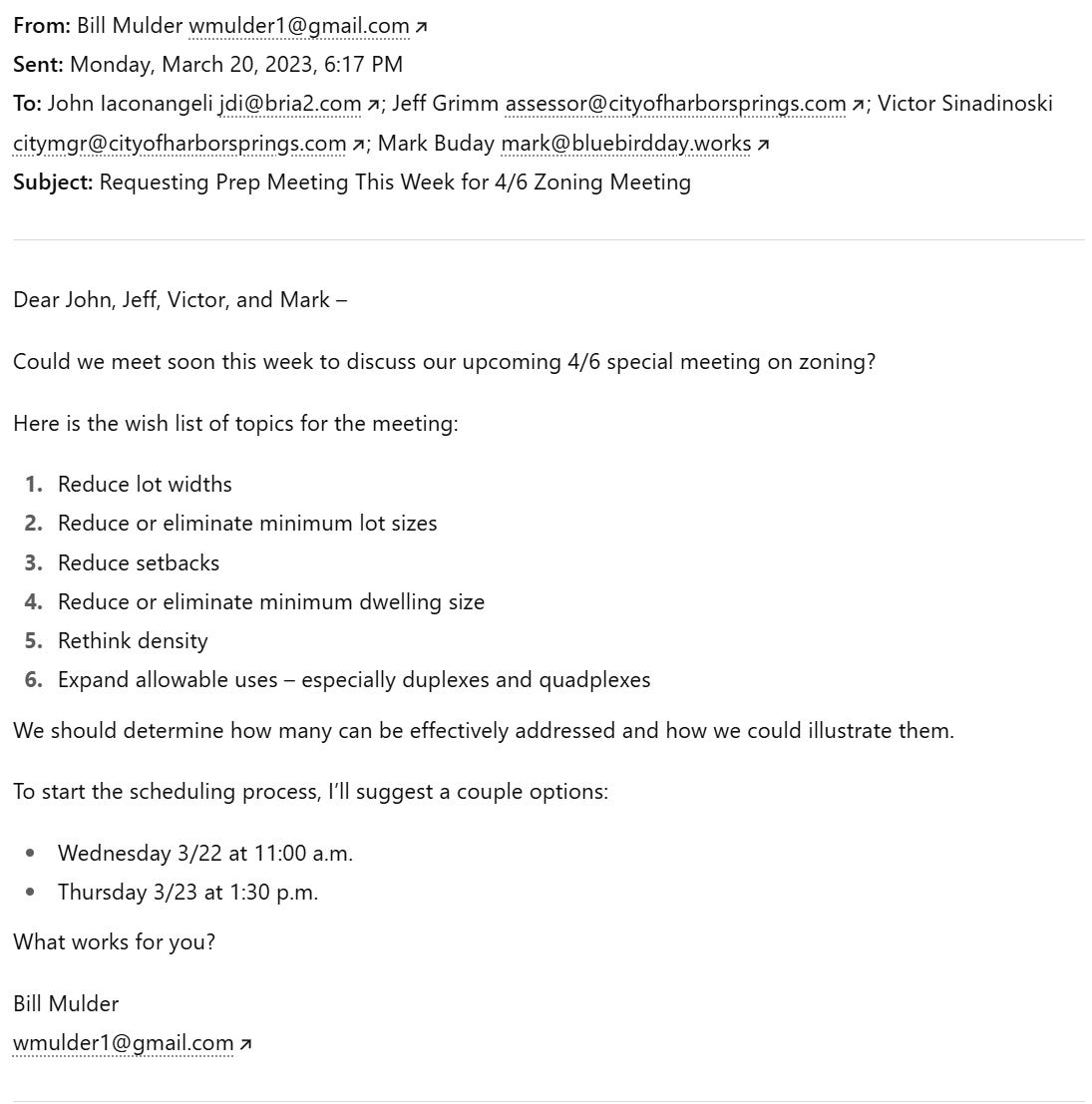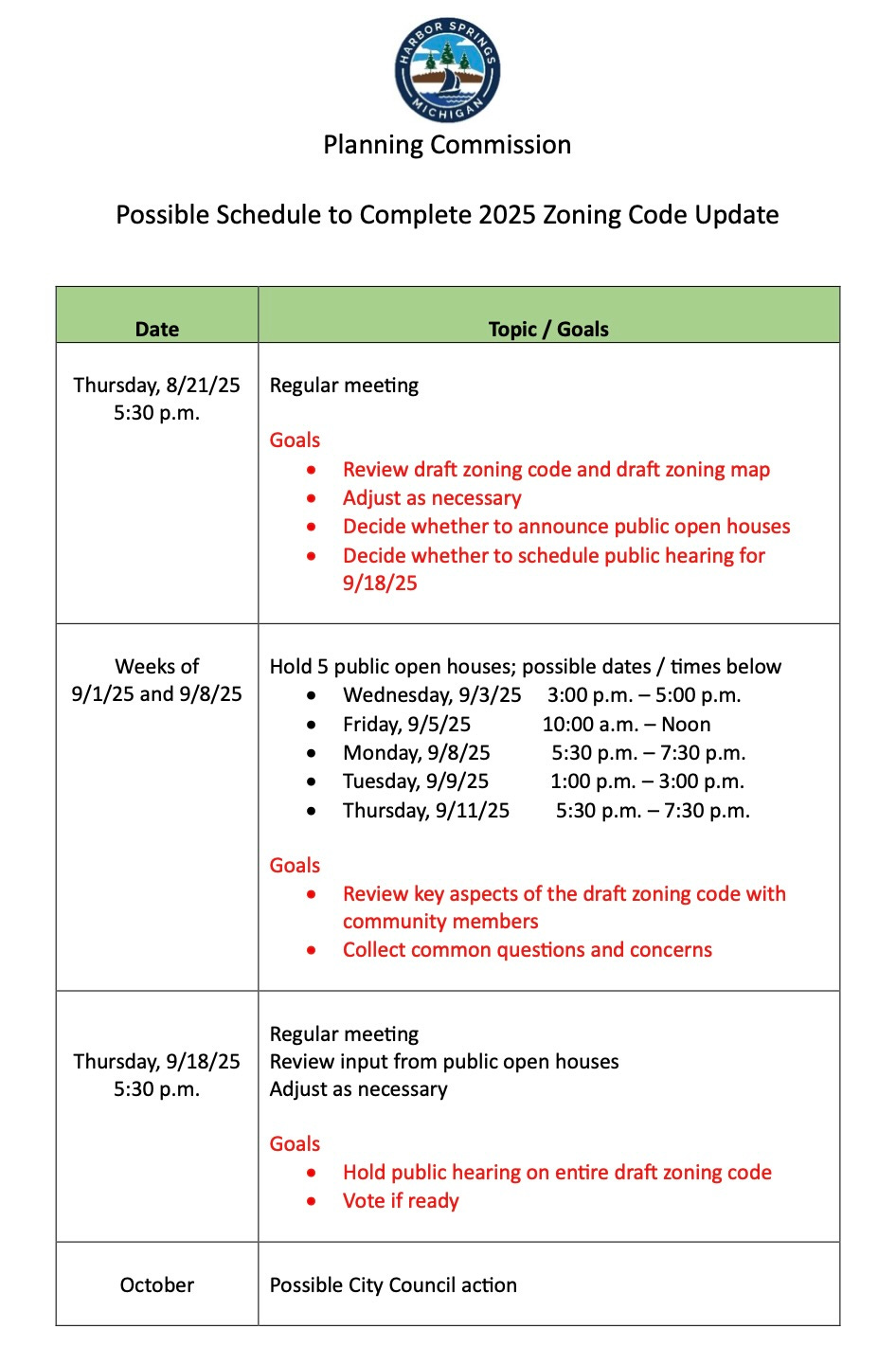Call to Action: From Conservancy to Cluster Housing, What Just Happened in Harbor Springs
In less time than it takes to drink a cup of coffee, cluster housing, co-living, administrative review, and Planned Developments got into the zoning code.
An Important Update
Last week’s Planning Commission inserted significant additions that increase housing density. Read the details below. We have included a link at the end so you can email City Hall with your concerns. Via button shown here and repeated below.
Thursday’s Planning Commission 8.21.25 Meeting
On Thursday, August 18, 2025, the Planning Commission managed to accomplish in under an hour what it had tiptoed around for months: They added cluster housing, co-living, administrative review, and new planned development standards into the proposed zoning code. And we still do not know why.
The irony is hard to miss. We spent weeks debating commas, fence heights, and lot dimensions, but when it came to changes that could reshape Harbor Springs for decades, the entire conversation was over before most people finished their first cup of coffee.
Up until that meeting, it felt like we were making progress. There were constructive discussions, a genuine effort to listen, and even flashes of common ground. Thursday was the opposite. It was a drive-by insertion of new policy, without the debate, transparency, or reflection these kinds of changes deserve.
Here’s the telling part: Having listened to nearly every meeting since January 2024 and spoken to hundreds of voters, we cannot recall a single resident asking for cluster housing, co-living units, administrative review, or expanded planned development rules. Not once. If anything, we’ve heard overwhelming concern about preserving the very character that makes Harbor Springs what it is.
We were just about to take the draft code to the broader community for input, an honest feedback loop. Instead, we’re left wondering if the Planning Commission itself has had a chance to truly understand the ripple effects of the amendments it has just adopted. Because if they do, they haven’t bothered to explain it. And if they don’t, then Thursday’s meeting was not just rushed; it was reckless.
This is where the weight of leadership matters. When Harbor Springs was tested in the past, our town fathers were paying attention and responded by creating the Little Traverse Conservancy in the wake of the Birchwood development, an act of restraint and foresight that still protects our community fifty years later. Taking around 30+ acres out of development.
Contrast that with today, when the Commissioners took 5 and 1/2 minutes to rule on Planned Developments, including on the Waterfront. Starting with,
“Can you think what districts you might want to exclude?” [Ed. Note: From Planned Developments] —- ”I'll go waterfront, industrial, and community, for sure …. Waterfront to me is pretty sacred”, to a final Commission decision (with two citizens in the room asking for more clarification), to open the door to PDs (think luxury hotels, resorts) in the Waterfront District, “You can arrange them in such a way, and condense them enough that you maybe increase the amount of area that you can see the lake …. We could actually make it more accessible. I don't see why it really needs to be specifically excluded from a planned development.” And, finally, the last word from the Chairman, PDs “Could actually give a way to open up more property for use by the public with the right kind of design.”
We went from Planned Developments being no less than 10 acres and one house per acre, to “let’s build on the waterfront.” In only a few minutes of conversation.
That’s not just a zoning tweak. It’s a profound misread of what this community values.
Great leaders are great listeners, not because they have to be, but because they want to be. - President Truman
The Planning Commission should ask itself: Are we truly listening, or have three years of zoning work left us with a kind of Stockholm Syndrome of our own making, mistaking endless process for consensus, and technical fixes for community values? Because in Harbor Springs, the difference will echo for generations.
Now, let’s look at the details of what they actually added.
Cluster housing – Allows homes to be built closer together on smaller lots, often with shared open space. In practice, it increases density while reducing the spacing and green space that define Harbor Springs neighborhoods. Where do you live? Why was this added?
Co-living houses – Permits up to six unrelated adults to live together in one house. This shifts housing toward high-occupancy rentals, employee housing or living arrangements similar to short term rentals (STR’s) and away from traditional family-scale homes in quiet and peaceful neighborhoods. Where do you live? Why was this added?
Administrative Review Decisions – Instead of the Planning Commission making approvals in public meetings, power is shifted to staff: the city assessor, city manager, city attorney, the Planning Commission chair, plus one commissioner, and the city’s planning consultant. This idea hasn’t been widely debated, likely because it could spark strong community opposition. Still, the Planning Commission decided to keep this option “on standby’’ but specifically enacted for shoreline protection. In the future, however, Administrative Review could reduce transparency and exclude neighbors from the process. Why was this added?
Planned Development (PD) projects in all zones except Industrial, Community, and Mobile Home districts – Gives developers broad leeway to exceed zoning limits (height, density, uses) if they claim a project has “community benefit.” Removing strict objective guidelines. Replaced with the judgment of the Planning Commission. This is one of the most powerful subjective developer tools, and expanding it citywide dramatically alters control over Harbor Springs growth in ALL Districts except Industry, Community and Mobile Homes. There are no criteria for consideration, no quid pro quo, nor acreage maximums. Nothing but subjectivity. Where do you live? Why was this added?
Accessory Dwelling Units (ADUs) permitted “by right” – While marketed to the community as a “flexibility” decision, ADU’s are now coupled with the added cluster, co-living, and Planned Development allowances, and they permanently increase density, infrastructure, and parking demand - with no case-by-case review. Without discussions on the impact of all of the above and ADUs on sewer capacity, these changes should be analyzed before any “by-right” permissions are given. Where do you live?
The Intent
In March 2023, according to all the records, the Planning Commission Chairman circulated a “wish list” that included:
Reduce lot widths and minimum lot sizes
Reduce setbacks
Eliminate minimum dwelling sizes
Rethink density
Expand allowable uses — especially duplexes and quadplexes
That list is now baked into the draft code. While increased density has been mentioned by a few people, there is no evidence of a majority decision. There is not ground swell driving density. It could be seen as a personal agenda, rather than a response to community demand; not a fix for persistent problems; and not consistent with the referendum. If density is the objective, have a debate on density.
The process is now rushing to the finish line. The Planning Commission is moving on to open houses in September, with expectations of City Council approving the Proposed Zoning Code in October.
Yet, the review has not been nearly as thorough as promised. Critical issues, such as infrastructure capacity, parking, long-term costs, lake shore and wetland protections, and architectural standards, as well as historical protections in the downtown and residential areas, have been barely discussed.
Honestly, instead of the careful, professional evaluation the community was promised, these substantive last-minute additions feel more like a rushed job.
Call to Action:
Please send in this letter to share your concerns about the recent decisions made by the Planning Commissioners CLICK HERE
📧 Body of Email Letter
This letter is what will appear in your email draft when you click the button. Please personalize before sending! These will come to our email box and we will collect, and submit as a bundle to the city. Thank you.
To: Harbor Springs Planning Commission and City Council
Subject: Request for Public Discussion on Zoning Amendments
Dear Planning Commission Members,
I urge you to pause and thoroughly revisit the zoning amendments added on August 18, 2025. Cluster housing, co-living, administrative review, expanded Planned Developments (including in the Waterfront District), with by-right ADUs, and were adopted in less than an hour—without public debate.
Expanding Planned Developments into the Waterfront risks forever changing the character of our shoreline. In November 2024, the largest majority vote in 15 years rejected similar changes, yet they have reappeared in the draft. That is not transparent or respectful of Harbor Springs residents.
Notices buried in the Harbor Light or taped to a grocery store wall are not sufficient public outreach. Every property owner deserves clear notice and a fair chance to weigh in before changes of this magnitude.
Please personalize before sending:
☐ I am a Harbor Springs voter
☐ I am a property owner
☐ I am a concerned citizen from the area
These changes require open debate, transparency, and broad community input before any approval.
Sincerely,
[Your Name]
[Your Address or Neighborhood]
Please double-check the City of Harbor Springs website for updated scheduling.
It’s vital to send in the Call to Action and attend the Public Open Houses. Thank you.






